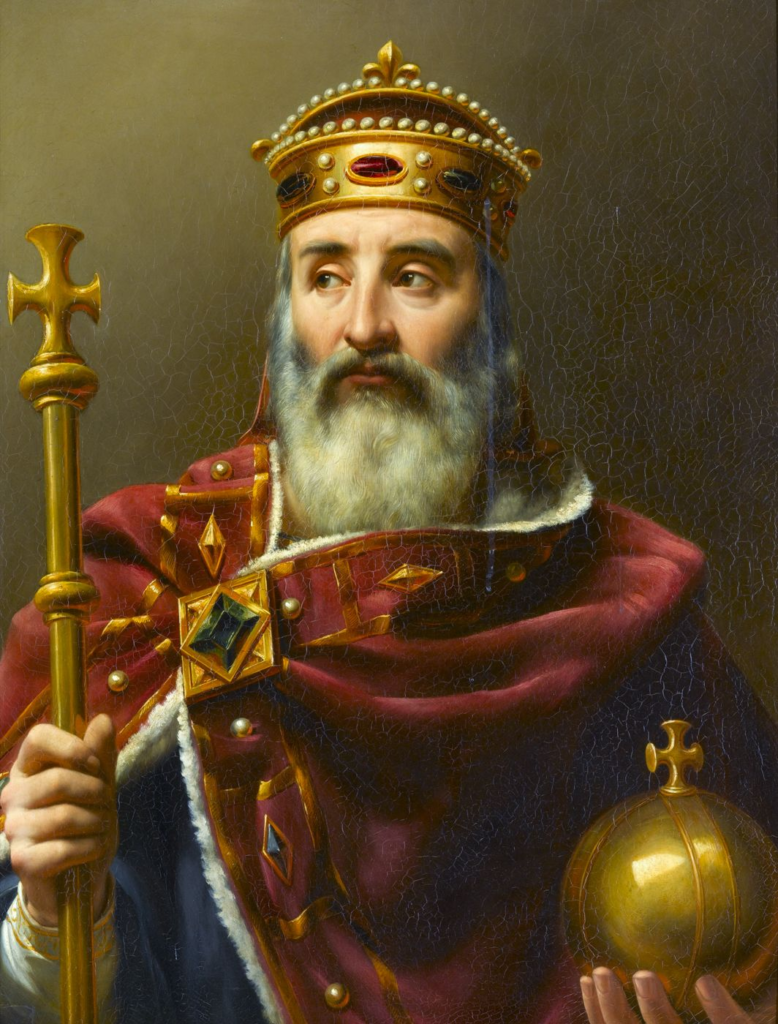European Royal Bloodline of the American Presidents – CHARLEMAGNE

By Raymond C. Wilson
King of the Franks (768-814)
King of the Lombards (774-814)
Holy Roman Emperor (800-814)
Charlemagne (son of Pepin III and Bertrada of Laon) was born on 2 April 742 in Northern Europe.
In 768, when Charlemagne (also known as Charles the Great) was 26, he and his younger brother Carloman inherited the kingdom of the Franks.
In 771, Carloman died, and Charlemagne became sole ruler of the kingdom.
At that time the Franks were falling back into barbarian ways, neglecting their education and religion.
The Saxons of northern Europe were still pagans.
In the south, the Roman Catholic Church was asserting its power to recover land confiscated by the Lombard kingdom of Italy.
Europe was in turmoil.
Charlemagne was determined to strengthen his realm and to bring order to Europe.
In 772, he launched a 30-year military campaign to accomplish this objective.
By 800 Charlemagne was the undisputed ruler of Western Europe.
His vast realm encompassed what are now:
- France
- Switzerland
- Belgium
and The Netherlands.
It included half of present-day Italy and Germany, and parts of Austria and Spain.
By establishing a central government over Western Europe, Charlemagne restored much of the unity of the old Roman Empire and paved the way for the development of modern Europe.
On Christmas Day in 800, while Charlemagne knelt in prayer in Saint Peter’s in Rome, Pope Leo III placed a golden crown on the bowed head of the king.
Charlemagne is said to have been surprised by his coronation as Holy Roman Emperor, declaring that he would not have come into the church had he known the pope’s plan.
However, some historians say the pope would not have dared to act without Charlemagne’s knowledge.
Charlemagne learned to read Latin and some Greek but apparently did not master writing.
At meals, instead of having jesters perform, he listened to visiting scholars read from learned works.
Charlemagne believed that government should be for the benefit of the governed.
He was a reformer who tried to improve his subject’s lives.
He set up money standards to encourage commerce and urged better farming methods.
Power of the Purse: The Origin of Money – Library of Rick and RIA (RARE Information Access)
In his personal life, Charlemagne had three wives:
- Desiderata
- Hildegard
- Fastrada
and five concubines:
- Himiltrude
- Gersuinda
- Madelgard
- Regina
- Ethelind
These women gave birth to 18 children:
- Pepin the Hunchback
- Charles the Younger
- Carloman (renamed Pepin)
- Adalhaid
- Rotrude (or Hruodrud)
- Louis
- Lothair
- Bertha
- Gisela
- Hildegarde
- Adaltrude
- Ruodhaid
- Theodrada
- Hiltrude
- Drogo
- Hugh
- Richbod
- Theodoric
He was reportedly a devoted father, who encouraged his children’s education.
He allegedly loved his daughters so much that he prohibited them from marrying while he was alive.
Charlemagne himself crowned his youngest son, Louis as his successor in 813 A.D. at Aachen.
The pope was not present at this coronation and had no role in it.
The empire was passed on to Louis upon Charlemagne’s death from pleurisy on 28 January 814 A.D.
Charlemagne’s former empire lasted only another generation in its entirety; its division, according to custom, between Louis’s own sons after their father’s death laid the foundation for the modern states of Germany and France.
SAUCE
BLOODLINE: European Royal Bloodline of the American Presidents – Library of Rickandria
The Merovingian Bloodline: The Lost Kings – Library of Rick and RIA (RARE Information Access)(Charlamagne was born in the final years of the Merovingian Dynasty)
